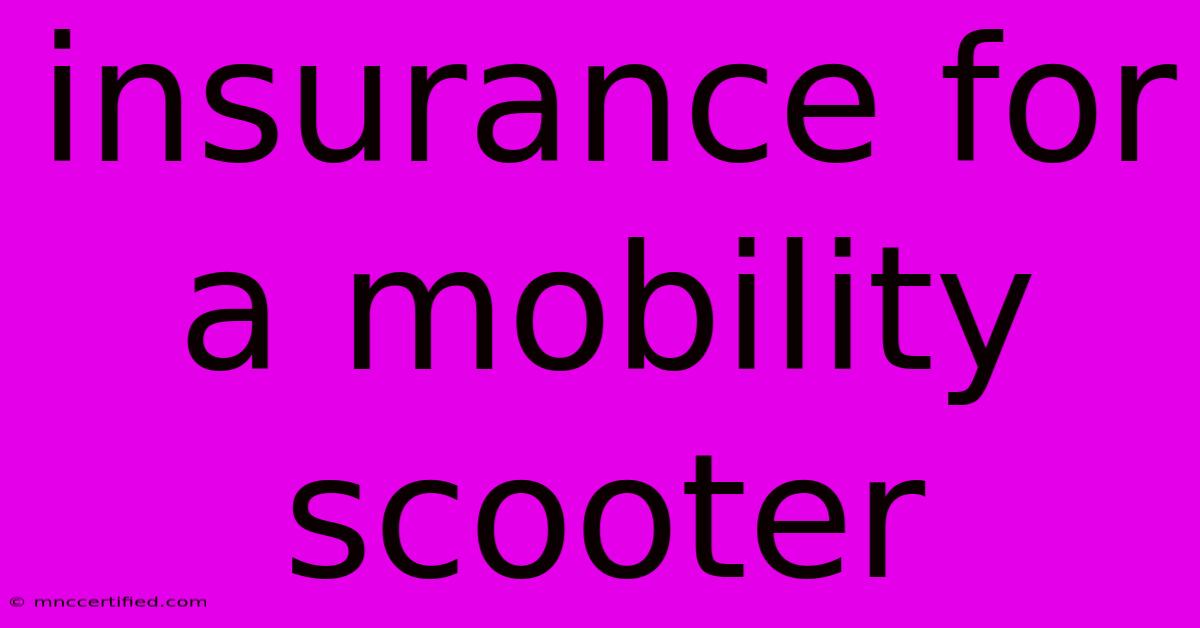Insurance For A Mobility Scooter

Table of Contents
Insurance for a Mobility Scooter: A Comprehensive Guide
Finding the right insurance for your mobility scooter is crucial for peace of mind and financial protection. This comprehensive guide explores the various types of insurance available, factors affecting premiums, and how to find the best coverage for your needs. We'll cover everything from liability to theft, ensuring you're fully informed before making a decision.
Why Insure Your Mobility Scooter?
Many assume that because mobility scooters are relatively inexpensive compared to cars, insurance is unnecessary. However, this is a misconception. Several compelling reasons highlight the importance of mobility scooter insurance:
- Liability Protection: If you're involved in an accident causing damage to property or injury to another person, liability insurance will cover the costs. This could easily run into thousands of dollars without adequate coverage.
- Theft Protection: Mobility scooters are unfortunately a target for theft. Comprehensive insurance can replace or repair your scooter if it's stolen or vandalized.
- Accidental Damage: Accidents can happen. Whether it's a fall, collision, or damage from weather, insurance can cover the repair or replacement costs, saving you significant expense.
- Peace of Mind: Knowing you're protected against unexpected events provides invaluable peace of mind, allowing you to enjoy the independence your mobility scooter offers.
Types of Mobility Scooter Insurance
The specific types of coverage available may vary depending on your location and insurance provider, but generally, you can expect to find options covering:
- Third-Party Liability: This covers damage or injury you cause to others. It's usually the minimum legal requirement, but it doesn't protect your own scooter.
- Comprehensive: This offers broader protection, including liability, theft, accidental damage, and potentially fire and vandalism.
- Accidental Damage: Covers repairs or replacement if your scooter is damaged in an accident, regardless of who is at fault.
- Theft: Covers the replacement or repair of your scooter if it's stolen.
Factors Affecting Your Mobility Scooter Insurance Premium
Several factors influence the cost of your insurance premium. Understanding these will help you find the most affordable coverage without compromising essential protection:
- Scooter Value: The value of your scooter directly affects the premium. More expensive scooters will typically command higher premiums.
- Scooter Type: The type and features of your scooter (e.g., size, speed, battery type) can influence the risk assessment and premium.
- Your Location: Insurance premiums vary based on location, reflecting factors like theft rates and accident frequency.
- Your Claim History: A history of insurance claims can lead to higher premiums.
- Your Age and Health: Some insurers may consider your age and health when assessing risk.
Finding the Right Mobility Scooter Insurance
Finding the best insurance policy involves careful research and comparison. Here's a step-by-step guide:
- Identify Your Needs: Determine the level of coverage you require based on your individual circumstances and risk tolerance.
- Get Quotes: Obtain quotes from multiple insurers. Use online comparison tools to save time and effort.
- Compare Policies: Carefully compare the coverage, premiums, and policy terms of different providers.
- Read the Fine Print: Thoroughly review the policy documents before signing up to fully understand the terms and conditions.
- Choose the Right Provider: Select the provider offering the best combination of coverage, price, and customer service.
Keywords for SEO:
mobility scooter insurance, scooter insurance, electric scooter insurance, mobility aid insurance, disability scooter insurance, insurance for mobility scooter, third party liability, comprehensive insurance, accidental damage insurance, theft insurance, mobility scooter insurance quotes, best mobility scooter insurance, cheap mobility scooter insurance, compare mobility scooter insurance
Note: This article provides general information and does not constitute financial or insurance advice. Always consult with an insurance professional for personalized guidance.

Thank you for visiting our website wich cover about Insurance For A Mobility Scooter. We hope the information provided has been useful to you. Feel free to contact us if you have any questions or need further assistance. See you next time and dont miss to bookmark.
Featured Posts
-
26 Foot Box Truck Insurance Cost
Nov 21, 2024
-
War And Treaty 2024 Cma Nominees
Nov 21, 2024
-
Leugers Insurance Maria Stein Oh
Nov 21, 2024
-
Insurance Company Name Generator
Nov 21, 2024
-
Example Certificate Of Insurance
Nov 21, 2024